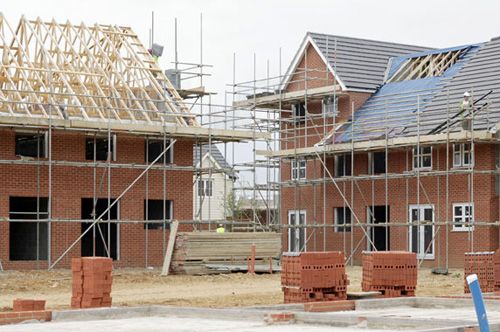 Housing minister Brandon Lewis has promised that one million homes will be built by 2020, committing the Government to a house-building target for the first time.
Housing minister Brandon Lewis has promised that one million homes will be built by 2020, committing the Government to a house-building target for the first time.
Despite setting the ambitious target for the Government over the course of the current Parliament, the ongoing low levels of residential construction and the industry’s inability to increase house-building further has meant many experts have questioned Mr. Lewis’ pledge.
Speaking to the BBC, he said: “By the end of this parliament, success I think would mean that we have seen a build in total of something like a million homes.”
This would require an average of 200,000 homes to be completed in each year of the current parliament. However in the 12 months to June 2015, official figures show only 131,060 homes were completed in England. The majority of these were built by the private sector, with housing associations and councils building substantially fewer.
The gap between the number of new homes needed – estimated to be around 245,000 a year – and those being built has become historic across multiple governments. England has not reached the target figure of 200,000 new homes per year since 1988/89, which in itself was an anomaly for the decade and furthermore, house-building in England has not consistently gained more than 200,000 new homes since the 1970s.
In fact, it has taken the last seven years to build one million homes in England, although the capabilities of the house-building market were severely damaged by the recession. Thousands of workers were forced out of the construction industry as a whole, leading to severe skills shortages across the house-building sector – a fact that is currently limiting how many new homes can be built.
Mark Farmer, head of development at the property consultancy Arcadis, said: “I wouldn’t underestimate how serious [the skills shortage] is. We haven’t delivered 200,000 [homes a year] for a long, long time and in that time we have lost people.”
A survey conducted earlier this year found that less than one in ten house-builders believe it would be possible to deliver more than 200,000 homes a year, every year under current conditions.
Until now, the Conservative Government has avoided setting a Parliamentary target for house-building, even when Labour pledged 200,000 homes a year in the its General Election campaign while the Liberal Democrats claimed it could have provided 300,000.

Instead, David Cameron promised to deliver 200,000 starter homes (discount properties for first-time buyers) and 275,000 affordable homes during the Parliament. The Government also promised to reform the planning system to make it easier to build by making more land available to the market, with changes already introduced in July to grant automatic planning permission for housing on some brownfield sites.
However, the shortage of skilled labour, a big drop in the number of councils building new homes and regulations restricting housing associations have also been blamed for the low levels of house-building. Despite setting this latest target of one million new homes by 2020, Brandon Lewis failed to deliver any concrete methods for reaching this goal.
According to the Federation of Master Builders, the Government’s ambition to build one million homes over the next five years must be backed up by a comprehensive housing strategy.
Brian Berry, chief executive of the FMB, said: “The Government’s target to build at least one million homes over the next five years is a great step forward to help address the growing housing crisis. What is needed now is a clear long-term strategy for housing to underpin the new one million target.
“The strategy needs to address the barriers that prevent new housing being built such as the need to speed up the planning process and a commitment to ensure local authority planning departments are adequately resourced. The recently published ‘FMB House-Builders’ Survey’ shows that the availability of suitable small sites is now the biggest barrier to SME house-builders building more new homes and any strategy must properly address this issue.
“We urge the Government to take further steps towards empowering the smaller house-builders which will play a crucial role in delivering the 200,000 homes a year target. Otherwise, the gap between what is needed and what is being delivered will remain considerable.”



